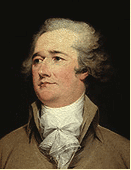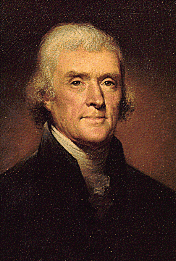|
restoring our biblical and constitutional foundations
|
President George W. Hamilton
Those who insist upon reducing George W. Bush to a one-dimensional line drawing of the visionary idealist prefer to explain away his position on power and morals by charging him with inconsistency or hypocrisy. Such views seem absurd to me. They only express the (understandable) irritation of those who oversimplify values, who wish to force an absolutist position even upon men who make it explicit that for them the actual consequences of any value for the welfare of human beings determine its weight in competition with alternative values. Indeed, Bush’s most revealing characterization of his philosophy of power breathes eternal defiance to the either-or, one-and-only type of opinion. Bush refers to the ideal of American democratic government as an “empire for liberty,” thus joining in lifelike tension two compelling concepts, one symbolizing strength for self-preservation, the other indicating the object for which that national strength is to be sought: so that freedom can be realized under the kind of benign government that values men and respects human rights.
It is in this sense, I believe, that the president was moved to say in his UN speech this week that “The advance of democratic institutions in Iraq is setting an example that others, including the Palestinian people, would be wise to follow. The Palestinian cause is betrayed by leaders who cling to power by feeding old hatreds and destroying the good work of others.” Hearkening back to his philosophy of “compassionate conservatism,” Bush said the war in Iraq was justified on the basis of the discovery of mass graves and torture chambers. He thus gave a defensive speech that revealed a continuing division in Washington over how aggressively to pursue more foreign troops for Iraq and about the UN’s role in Iraq. The New York Times noted that the response to Bush’s UN speech was cool and applause was mild compared to the cheers that followed the speeches of UN Secretary General Kofi Annan and French President Jacques Chirac, both of whom denounced preemptive and unilateral military actions. And in an oblique reference to the “I told you so” tone of the president’s remarks, the Spanish daily El Pais noted, “The president reasserted his justification for the [Iraq] invasion without recognizing the errors of the strategy and postwar reconstruction.”
I believe we find ourselves, at the time of growing
American imperialism, in a climate of thought strangely reminiscent of
 Alexander
Hamilton, for it was he who played the most active role in speeding up the
process that led from a financially impotent federation to a financially
functioning central government. It was also Hamilton who seized upon the
“broad” interpretation of the Constitution to stretch its vulnerable
clauses as protection for the growth of federal power. In this sense, the
work of Hamilton and the current Bush administration are properly seen as
a continuing logic as well as a shared interest. On matters of central
economic doctrine Hamilton stood in contrast to Jefferson, who was an
advocate of those parts of the Adam Smith doctrine that denied the state a
positive role in economic matters and promoted free trade, whereas
Hamilton felt it was necessary for the government to create positive
conditions for economic growth. Hamilton asserted a principle that we can
certainly appreciate in our own day: “A national debt, if it is not
excessive, will be to us a national blessing. It will be a powerful cement
of our Union. It will also create a necessity for keeping up taxation to a
degree, which, without being oppressive, will be a spur to industry.”
Alexander
Hamilton, for it was he who played the most active role in speeding up the
process that led from a financially impotent federation to a financially
functioning central government. It was also Hamilton who seized upon the
“broad” interpretation of the Constitution to stretch its vulnerable
clauses as protection for the growth of federal power. In this sense, the
work of Hamilton and the current Bush administration are properly seen as
a continuing logic as well as a shared interest. On matters of central
economic doctrine Hamilton stood in contrast to Jefferson, who was an
advocate of those parts of the Adam Smith doctrine that denied the state a
positive role in economic matters and promoted free trade, whereas
Hamilton felt it was necessary for the government to create positive
conditions for economic growth. Hamilton asserted a principle that we can
certainly appreciate in our own day: “A national debt, if it is not
excessive, will be to us a national blessing. It will be a powerful cement
of our Union. It will also create a necessity for keeping up taxation to a
degree, which, without being oppressive, will be a spur to industry.”
Central to any meaningful understanding of George W.
Bush are his views about power, and, again, the parallels with Hamilton’s
interests are notable. Hamilton’s conception of power joined political
power with money. “Money is, with propriety, considered as the vital
principle of the body politic,” he wrote. It is only where the men who
govern are moneyed can one rightly expect to have energetic government, he
said. Furthermore, when real issues concerning money and power arose,
Hamilton showed himself willing to use coercion and force, as in the
famous case of the Newburgh
 Affair.
And in his later years, when he orchestrated the downfall of his own
Federalist Party, he wrote, “It is yet to be determined by experience
whether Republican government can be consistent with that stability and
order in government which are essential to public strength and private
security and happiness.”
Affair.
And in his later years, when he orchestrated the downfall of his own
Federalist Party, he wrote, “It is yet to be determined by experience
whether Republican government can be consistent with that stability and
order in government which are essential to public strength and private
security and happiness.”
A curious meeting once took place between Jefferson and Hamilton that helps us to explain the contrast between these two famous Americans. Jefferson reported that Hamilton, on a visit to his rooms, saw his collection of three portraits and asked Jefferson who they were. Jefferson named them—Bacon, Newton, and Locke—and expressed his admiration for them as the greatest men of all time. Hamilton paused and then remarked, “The greatest man that ever lived was Julius Caesar.”
Thus we have two very different visions of man and society—Jefferson the advocate of luminous reason, and Hamilton the visionary of energetic power, with instruments of military, political, and economic force to protect, sustain, and enhance such power. The devotion to the image of Caesar goes far in explaining Hamilton’s character, for in his conduct and thought—no less than in the case of President Bush—is the embodiment of an ageless theme: the pervasive drive for power. Hamilton stated this himself with astonishing prescience when, as a twelve year old child clerk in a West Indian trading house, he wrote:
To confess my weakness, Ned, my ambition is prevalent, so that I contemn the groveling condition of a clerk or the like, to which my fortune, etc. condemns me, and would willingly risk my life, though not my character, to exalt my station. I am confident…that my youth eludes me from any hopes to immediate preferment; …but I mean to prepare the way for futurity…. I shall conclude saying, I wish there was a war.
September 26, 2003
David Alan Black is the editor of www.daveblackonline.com. He is currently finishing his latest book, Why I Stopped Listening to Rush: Confessions of a Recovering Neocon.